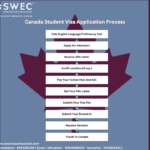
Canada! With its stunning scenery, welcoming communities, and top-notch education system, it’s no wonder so many international students dream of studying there. If you’re one of them, this guide will walk you through the Canadian student visa (study permit) application process in a clear and simple way. Let’s turn your Canadian dream into reality!
Eligibility Criteria for Study Permit Canada
To be eligible for a Canadian study permit, you’ll need to meet a few key requirements:
-
- Acceptance Letter: You must have a valid acceptance letter from a DLI – a university, college, or other school authorized to host international students.
-
- Financial Stability: You’ll need to show you have enough money to cover tuition fees and living expenses in Canada. This usually involves proof of funds for you and any dependents coming with you.
-
- Language Skills: Demonstrate your English or French proficiency with an approved test like the IELTS or TEF.
-
- Clean Bill of Health: An Immigration Medical Examination (IME) is mandatory to make sure you meet Canada’s health requirements.
Gathering Your Visa Application Toolkit
Now that you know the essentials, let’s get down to business! Here are the documents you’ll likely need:
-
- Valid Passport: Make sure it has at least six months of validity beyond your planned study stay.
-
- Acceptance Letter: This official document from your DLI confirms your spot in a specific program.
-
- Proof of Funds: This could be bank statements, scholarship letters, or proof of sponsorship if someone else is covering your costs.
-
- Immigration Medical Examination (IME) Results: This document shows you’re healthy enough to enter Canada.
-
- Proof of Language Proficiency: Your test scores from IELTS, TEF, or another approved language test.
-
- Study Plan (Optional but Recommended): This is your chance to shine! Briefly explain your academic goals, why you chose this program, and how your studies fit into your future career plans in Canada.
-
- Additional Documents: Depending on your situation, you might need things like a letter explaining gaps in your education or police certificates.
How to Apply for a Canadian Student Visa
There are two main ways to submit your Canadian student visa application:
-
- Online Application: The most convenient option! You can upload documents electronically through the Immigration, Refugees and Citizenship Canada (IRCC) website. (https://www.canada.ca/en/immigration-refugees-citizenship/services/study-canada/study-permit/apply.html)
-
- Paper Application: While less common, you can download the application package, fill it out by hand, and mail it with your supporting documents to the nearest visa application center (VAC).
Boosting Your Application’s Chances
Meeting the requirements is important, but here are some extra tips to make your application stand out:
-
- Start Early: Processing times can vary, so get the ball rolling well before your intended study start date.
-
- Accuracy is Key: Double-check that all your documents are complete, valid, and formatted correctly. Even small mistakes can cause delays.
-
- Showcase Your Potential: Craft a compelling study plan that highlights your academic goals, how your chosen program aligns with your career aspirations, and the unique value you’ll bring to Canada’s student community.
-
- Consider Professional Help: A registered visa consultant can offer personalized advice and assist you throughout the application process. (Here, you can subtly mention your consultancy services in Ahmedabad).
Beyond the Visa: Getting Ready for Canada
Getting your student visa is just the first step! Here are some additional things to keep in mind:
-
- Cost of Living: Research living expenses in your chosen Canadian city and factor these costs into your financial plan.
-
- Pre-Departure Checklist: Open a Canadian bank account (optional), arrange student health insurance, and familiarize yourself with Canadian customs regulations.
-
- Life in Canada: Explore resources available for international students, including student support services offered by your DLI and cultural adjustment programs.
What to do after Applying for a Canada Student Visa?
Once you’ve submitted your application, it’s time to relax (a little)! Processing times can vary, so be patient and keep an eye out for updates from IRCC. Here are some additional things to consider:
-
- Gather Additional Documents (if requested): IRCC might request additional documents during processing. Be prepared to submit them promptly to avoid delays.
-
- Track Your Application: You can check the application status online through the IRCC website using your unique application number.
-
- Prepare for the Landing: If your application is successful, you’ll receive a Port of Entry Letter of Introduction (POE Letter). This allows you to apply for a visa at a Canadian port of entry, like an airport.
Conclusion
By following these steps and staying organized, you’ll be well on your way to securing your Canadian student visa and embarking on an unforgettable educational journey in the land of maple syrup and majestic landscapes. Good luck!
Frequently Asked Questions
Q1. Who can apply for a Canadian student visa (study permit)?
Ans 1. To be eligible for a Canadian student visa, you’ll need to meet a few key criteria:
- Acceptance Letter: You must have a valid acceptance letter from a Designated Learning Institution (DLI) – a university, college, or other school authorized to host international students.
- Financial Stability: You’ll need to demonstrate sufficient financial resources to cover tuition fees and living expenses in Canada. This typically involves proof of funds for yourself and any accompanying dependents.
- Language Proficiency: You’ll need to show off your English or French language skills with an approved test like the IELTS or TEF.
- Clean Bill of Health: An Immigration Medical Examination (IME) is mandatory to ensure you meet Canada’s health requirements.
Q2. What are the two main ways to apply for a Canadian student visa?
Ans 2. You can submit your Canadian student visa application through two primary methods:
- Online Application: This is the most convenient option! You can upload documents electronically through the Immigration, Refugees and Citizenship Canada (IRCC) website. (https://www.canada.ca/en/immigration-refugees-citizenship/services/study-canada/study-permit/apply.html))
- Paper Application: While less common, you can download the application package, fill it out by hand, and mail it with your supporting documents to the nearest visa application center (VAC).
Q3. What documents do I need to include in my Canadian student visa application?
Ans 3. The specific documents you’ll need may vary depending on your situation, but here’s a general list:
- Valid Passport (with at least 6 months validity beyond your study stay)
- Acceptance Letter from a DLI
- Proof of Funds (bank statements, scholarship letters, sponsorship documents)
- Immigration Medical Examination (IME) Results
- Proof of Language Proficiency (IELTS, TEF, etc. test scores)
- Study Plan (optional but recommended)
- Additional Documents (police certificates, letter explaining gaps in education, etc.)
Q4. How long does it take to process a Canadian student visa application?
Ans 4. Processing times for Canadian student visa applications can vary depending on your situation and the workload of IRCC. It’s generally recommended to apply well in advance of your intended study start date. You can check current processing times on the IRCC website.
Q5. What happens after I submit my Canadian student visa application?
Ans 5. Once you submit your application, you can expect to receive updates from IRCC via email or online portal. They might request additional documents during processing. You can also track the application status online using your unique application number.
Q6. What should I do if my Canadian student visa application is rejected?
Ans 6. If your application is rejected, IRCC will provide you with a written explanation outlining the reasons for the denial. You may be eligible to re-apply if you can address the reasons for rejection. Consider consulting a registered visa consultant for guidance on this process. (Here, you can subtly mention your consultancy services in Ahmedabad).
Q7. Do I need to apply for a separate visa to enter Canada after my student visa is approved?
Ans 7. Yes, if your student visa application is successful, you’ll receive a Port of Entry Letter of Introduction (POE Letter). This allows you to apply for a visa at a Canadian port of entry, like an airport, before officially entering Canada.
Q8. Can I work in Canada while studying with a student visa?
Ans 8. Yes, there are certain limitations, but student visa holders are generally allowed to work part-time on campus or off-campus with a valid work permit. You can find more information on student work permits on the IRCC website.
Q9. What are some helpful resources for Canadian student visa applicants?
Ans 9. Here are some valuable resources to guide you through the Canadian student visa application process:
- Immigration, Refugees and Citizenship Canada (IRCC) website: https://www.canada.ca/en/immigration-refugees-citizenship/services/study-canada/study-permit/apply.html)
- Canadian embassies and consulates abroad:
Q10. Is it advisable to seek professional help with my Canadian student visa application?
Ans 10. While not mandatory, seeking guidance from a registered visa consultant can be highly beneficial. They can offer personalized advice, assist with the application process, ensure all documents are complete and formatted correctly, and provide support throughout the journey. This can significantly increase your chances of a successful application. (Here, you can subtly mention your consultancy services in Ahmedabad).





